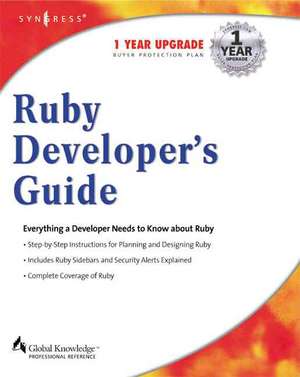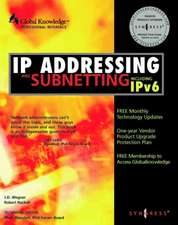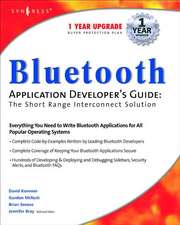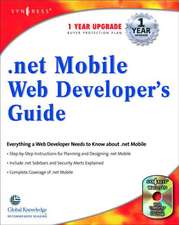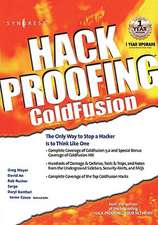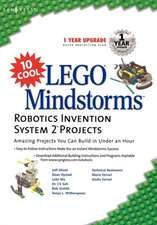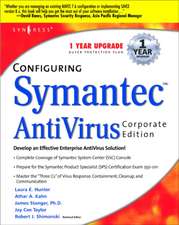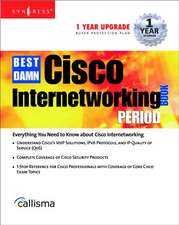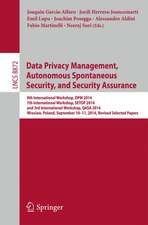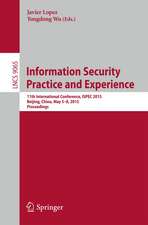Ruby Developers Guide
Autor Syngressen Limba Engleză Paperback – 5 feb 2002
Ruby is quickly becoming a favourite among developers who need a simple, straight forward, portable programming language. Ruby is ideal for quick and easy object-oriented programming such as processing text files or performing system management. Having been compared with other programming languages such as Perl, Python, PCL, Java, Eiffel, and C++; Ruby is popular because of its straight forward syntax and transparent semantics.
Using step-by-step examples and real world applications, the Ruby Developer's Guide is designed for programmers and developer's looking to embrace the object-oriented features and functionality of this robust programming language. Readers will learn how to develop, implement, organize and deploy applications using Ruby.
- Ruby is currently experiencing a rapid rise in popularity in the object-oriented programming community
- Readers receive up-to-the minute links, white papers, and analysis for two years at solutions@syngress.com
- Comes with a wallet-sized CD containing a printable HTML version of the book, all of the source code examples and demos of popular Ruby third-party programming tools and applications
Preț: 396.11 lei
Preț vechi: 495.14 lei
-20% Nou
Puncte Express: 594
Preț estimativ în valută:
75.80€ • 82.31$ • 63.68£
75.80€ • 82.31$ • 63.68£
Carte tipărită la comandă
Livrare economică 22 aprilie-06 mai
Preluare comenzi: 021 569.72.76
Specificații
ISBN-13: 9781928994640
ISBN-10: 1928994644
Pagini: 520
Dimensiuni: 191 x 235 x 43 mm
Greutate: 1.22 kg
Editura: ELSEVIER SCIENCE
ISBN-10: 1928994644
Pagini: 520
Dimensiuni: 191 x 235 x 43 mm
Greutate: 1.22 kg
Editura: ELSEVIER SCIENCE
Public țintă
Written for developer's looking to extend their skills. A fundamental knowledge of Ruby is assumedCuprins
Chapter 1: Booting Ruby
Chapter 2: GUI Toolkits
Chapter 3: Databases and Data-Storages
Chapter 4: XML and Ruby
Chapter 5: Concurrent and Distributed Ruby
Chapter 6: World Wide Web and Networking Applications
Chapter 7: Libraries and Tools
Chapter 8: Specifications and Testing
Chapter 9: Profiling and Performance Tuning
Chapter 10: Ruby Best Practice Patterns
Chapter 11: Parsers and Code Generators
Chapter 12: Ruby Internals
Chapter 13: Extending and Embedding Ruby
Chapter 14: Ruby Solutions Fast Track
Chapter 2: GUI Toolkits
Chapter 3: Databases and Data-Storages
Chapter 4: XML and Ruby
Chapter 5: Concurrent and Distributed Ruby
Chapter 6: World Wide Web and Networking Applications
Chapter 7: Libraries and Tools
Chapter 8: Specifications and Testing
Chapter 9: Profiling and Performance Tuning
Chapter 10: Ruby Best Practice Patterns
Chapter 11: Parsers and Code Generators
Chapter 12: Ruby Internals
Chapter 13: Extending and Embedding Ruby
Chapter 14: Ruby Solutions Fast Track
